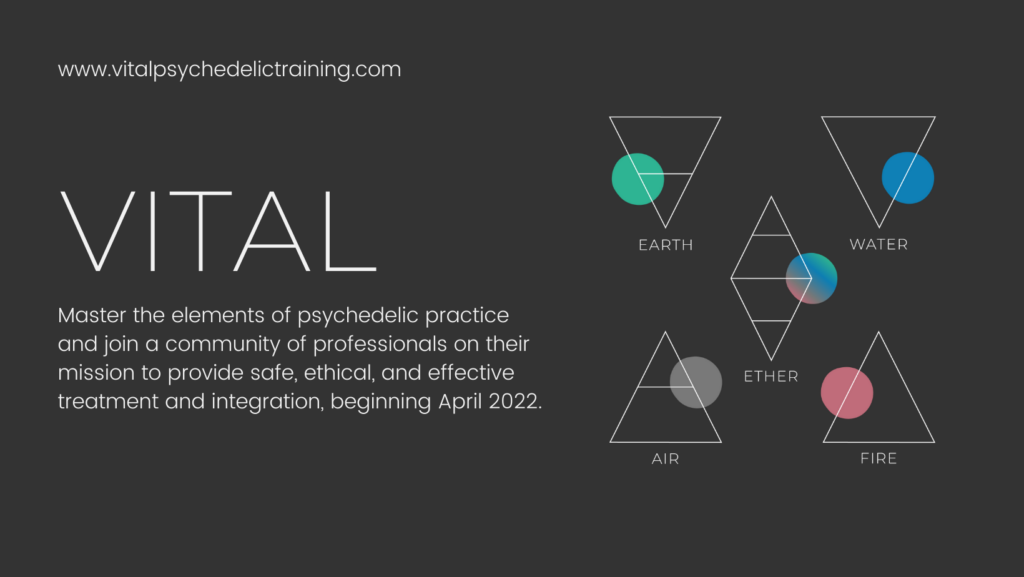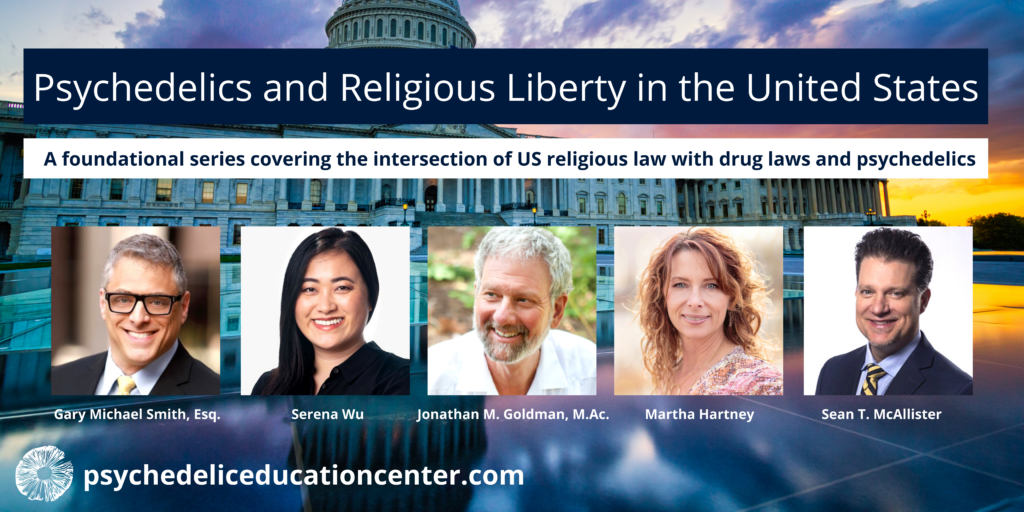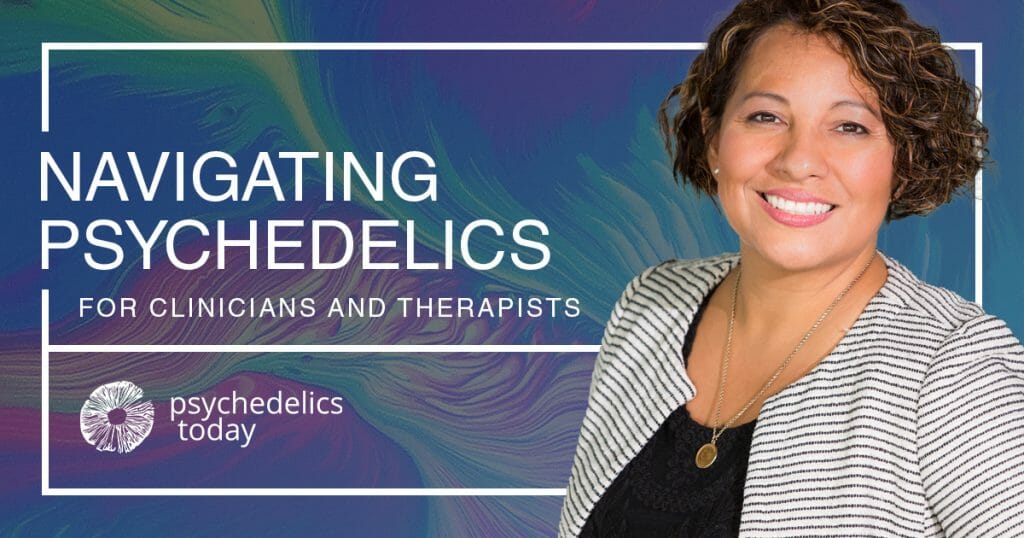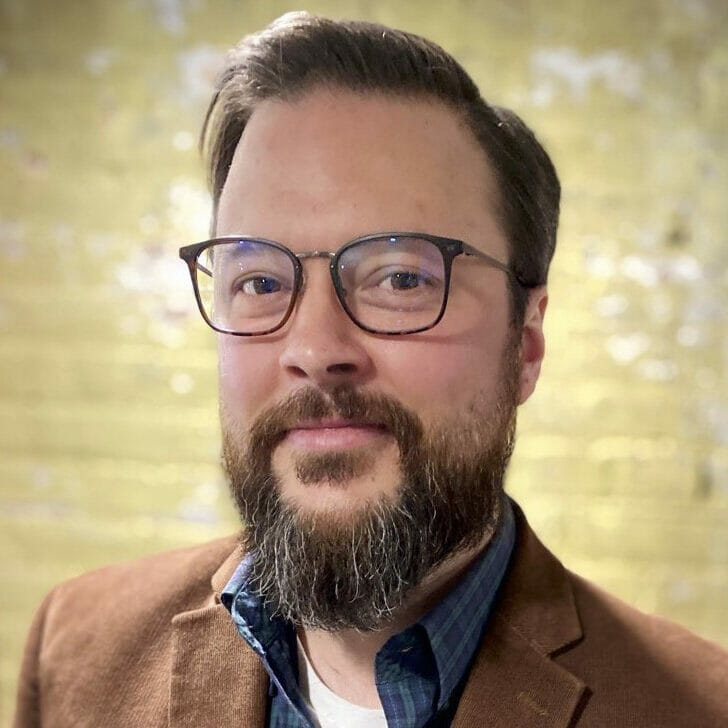Jon Dennis, Esq. looks closely at what Oregon’s Measure 109 really says, and provides a possible framework for the fair treatment of religious-use sacrament.
Oregon’s Psilocybin Services Act, aka Measure 109, is currently undergoing a reputational makeover. Although primarily advertised to voters as “psilocybin therapy,” clinical use of psilocybin is only one of the many modalities of psilocybin services that may soon be permitted in Oregon. Nearly all of the media reporting on M109 have echoed the messaging of the M109 electoral campaign, creating a narrative that Oregon voted to legalize “psilocybin therapy.” But now that people are beginning to write and speak about M109 in a more careful and nuanced way, many are surprised to find out that the psilocybin law passed in Oregon allows people to take psilocybin for virtually any reason.
If there is still any doubt about whether M109 is a “therapy” program, Tom Eckert, one of the chief co-petitioners of Measure 109 and now the chair of the Oregon Psilocybin Advisory Board (“OPAB”) (as well as a practicing therapist), said in a recent interview that “The idea [of M109] is to create safe space under the facilitation of licensed professionals to explore [the psilocybin] experience for personal benefit.” According to Eckert, taking psilocybin under M109 is “about your consciousness and using psilocybin however you really want to, whether it’s creative, spiritually, or for a therapeutic benefit.”
This means, of course, that psilocybin may be used pursuant to religious or spiritual exercise. It means that psilocybin churches might soon become commonplace in Oregon.
The intersection of M109 and religious liberties is an important and complex topic that so far has received very little attention during the meetings of OPAB and its 5 subcommittees. Religious exploration is already a large part of this so-called “psychedelic renaissance,” and all signs point to religious use of psychedelics becoming more prevalent over time. Because the “Oregon model” of psychedelic services has become one of the leading models in psychedelic policy reform, it is paramount we build religious protections into the model.
In response to public comment, the Oregon Health Authority (“OHA”) recently published the following statement:
Q: Can the psilocybin services be offered within a ceremonial or religious context?
A: Yes, if psilocybin services take place at a licensed service center and is otherwise compliant with statute and rule requirements.
In other words, OHA intends to allow the religious use of psilocybin if performed in accordance with Oregon’s regulatory framework for psilocybin. The preceding sentence constitutes pretty much everything we know so far about how Oregon intends to address religious practice under the measure. This is particularly concerning in light of the fact that OPAB has many complex issues to still resolve, and it must issue its final recommendations by June 30 – meaning there are only 15 hours of full OPAB meeting time remaining. Time is running out for Oregon to create thoughtful and nuanced policy on this matter of great importance.
Fortunately, serious conversations about religious practice are about to begin. The February 2 meeting of the Equity Subcommittee and the February 3 meeting of the Licensing Subcommittee and the Equity Subcommittee will address religious use.

What is Essential to a Religious-Use Framework?
When considering what a religious-use framework might look like under M109, I identify six elements that are essential:
- It must permit a broad range of religious practices and ceremonies without unnecessary interference from the government. Protections should accommodate practices and beliefs ranging from traditional Indigenous practices to contemporary Western, Eastern, and neo-shamanic religions that incorporate psilocybin into their practices;
- It must create a pathway for religious practice that is affordable to marginalized communities;
- The regulations should allow special rules around the growing, storing, handling, and testing of psilocybin mushrooms that reflect the view common in many entheogenic communities that the mushrooms themselves are sacred objects worthy of reverential treatment;
- The regulations must provide meaningful oversight of and accountability for religious practitioners, particularly in:
- Screening new members;
- Disclosing risks/obtaining informed consent;
- Preventing abuse; and
- Ensuring that religious practice is conducted in a safe manner;
- Given the Oregon constitution’s protection of both the religious and the non-religious*, the regulations must not give preferences to “religious” over “non-religious” organizations or individuals. Accordingly, the criteria for who may operate within the “religious framework” should be framed in terms of sincere practice relating to one’s deeply-held values, beliefs, and convictions, rather than affiliation with a religious organization;
- It should be simple enough to administer that it does not cause a substantial burden on OHA.
With these considerations in mind, I have taken the liberty of drafting a proposed model regulatory framework for how religious practice could be protected under Measure 109. My proposed framework may be found here:
I am actively seeking stakeholder feedback. Please email me with questions or comments. To execute this project well means compiling and assembling a wide range of stakeholder input, so please do reach out.

One of the fundamental assumptions underlying the model is that if religious-use privileges are only affordable to a small subset of the population, it might actually be better to not grant special religious privileges at all. Perhaps the most iniquitous aspect of M109 is that access to psilocybin will be unaffordable to a lot of people. Luckily, as we will see, religious use privileges can be structured in a manner that creates new pathways to affordable access.
Several key features of this framework may be aided by some explanation.
Peer-Support Assistance
Measure 109 requires that all psilocybin be purchased, possessed, and consumed “under the supervision of a …facilitator” (Section 57 (2)). The measure does not otherwise describe what that supervision should look like, which leaves open many possibilities.
Currently it appears that Oregon is poised to require that the majority of assistance given to clients must be provided by paid facilitators, who are prohibited from taking psilocybin while serving as a facilitator. If this is the case, even if Oregon adopts liberal rules that require lower amounts of paid facilitation, I estimate that a “cheap” group session, offered by a nonprofit, will not be available for less than $500 per person, including the costs of psilocybin. This is inequitable. We can do much better.
Luckily, Indigenous and other religious and spiritual communities have substantial history and experience using plant medicines as sacraments in ceremony. They provide clear proof that ceremony can be safely conducted without the need for paid facilitators who abstain from fully participating in the ceremony. Accordingly, religious communities who operate under M109 should have the option to provide their own peer-support assistance through community members that have been certified by their community as being qualified and capable to provide that assistance.
Reasonable minds could disagree about how much the state should regulate that certification. Regulation could be enacted to encourage the slow and sustainable growth of these organizations and to ensure that the clients who provide peer-support assistance are familiar with and oriented to the community in which they intend to serve. Successful implementation of this system will require relationship-building within each community, and the regulations could require that a client be involved with a community for a period of time (which could be defined by a minimum number of ceremonies attended) before they begin providing peer-support assistance. Or the regulations could simply trust the community to responsibly manage itself, particularly in light of the fact that its licensure could be lost if it behaves irresponsibly.

The freedom to exercise one’s religion means little if paywalls keep most people out. However, if peer-support assistance is allowed, it could avoid having to pay unneeded facilitators to “supervise” ceremonies. The number of facilitators that are needed to safely supervise a ceremony may vary by community, but well-organized communities could conceivably conduct ceremonies safely with only one facilitator present. By reducing the number of facilitators that must be on hand for a ceremony, we drastically reduce the cost of the ceremony.
Additionally, many entheogenic religions do not permit people into their ceremonial space who have not consumed at least some amount of their sacrament. The idea in some communities is that the presence of people who are on a different vibrational wavelength (i.e., who have not partaken of the sacrament) fundamentally prevents participants from receiving certain religious benefits. Facilitators are prohibited from taking psilocybin while serving as a facilitator, so allowing facilitators to supervise from outside the ceremonial space is the only option if this view is to be respected. This could be safely done if peer-support assistance were permitted by clients who are participating in the ceremony. This permits a higher degree of self-governance and self-reliance, which is healthy.
This peer-support assistance model was inspired in part by the practices of the Church of the Holy Light of the Queen (“CHLQ”). CHLQ is the Santo Diame church who successfully sued the federal government for the right to use Daime (which some people call ayahuasca) in their religious practices.** In their 25 years of practice, it is my understanding that CHLQ has never had a safety situation which they were not able to safely manage internally. For people interested in learning more about that, I interviewed Padhrino Jonathan Goldman, the spiritual leader of CHLQ, on Episode No. 6 of Eyes on Oregon.
Religious Manufacturing Privileges
The religious manufacturing privileges contemplated by the framework are severalfold:1) Religious communities are granted permission to grow mushrooms in a less-regulated (i.e., far less expensive) manner than is required of standard manufacturers;
2) Religious growers may grow the species of mushrooms using techniques and substrates that are consistent with their beliefs and convictions, provided that products are safe;
3) Testing of religious products is not required, unless indicated by a client’s adverse medical reaction;
4) Religious products may not be delivered to a service center that is not a religious service center; and
5) Religious growers are under a duty to provide safe products and avoid creating nuisances and other environmental hazards.
The policy considerations behind the proposed religious manufacturing privileges are two-fold: 1) it gives communities the option to offer very low-cost products (mushrooms are famously cheap to grow); and 2) it creates space for Oregon plant medicine communities who believe that the mushrooms themselves are sacred and must be handled with reverence.
Product safety can be maintained without the need for expensive laboratories. Unlicensed, unregulated mushroom growers – many of whom grow in their basements or closets using improvised laboratory equipment – currently create the bulk of consumer psilocybin products. This matters because it serves as a counterpoint to the concern that “under-regulated” manufacturing operations pose a threat to public health or safety. In truth, reports of adverse reactions to unsafe psilocybin products are exceedingly rare, particularly in light of the amount of mushrooms being eaten nowadays.
While the idea of permitting a religious or spiritual community to have homegrown sacramental mushrooms might make some people uncomfortable, it’s worth remembering that you can buy myceliated grow kits for gourmet mushrooms virtually everywhere, and society allows that practice without question. Moreover, the practice of a religious or spiritual community handling its own sacrament in accordance with their beliefs and convictions is a practice that predates Oregon statehood.
Relaxed Testing Requirements
Oregon is required by M109 to consider the costs of testing to the client when deciding its testing rules, and testing may not be more onerous than is reasonably necessary for health and safety (Section 96 (7)). Moreover, testing standards must be different for different “varieties of psilocybin products” (Section 96 (1)(d)), which could presumably include mushrooms grown for use in religious ceremony. Relaxed testing rules for religious products will help the state achieve its statutory mandate of striving for an affordable system, while also respecting practitioner beliefs. While this could create greater imprecision in dosing, this is the current state of things in our existing unregulated market, and people safely manage that imprecision.
Affordability
In addition to providing meaningful autonomy of religious practice, the combination of peer-support assistance and less-regulated religious manufacturing and testing starts to get us close to an affordable system. If all three are adopted, a lower and more satisfying price point begins to emerge. The costs for services may even be as low as the combination of one facilitator’s time that is spread across multiple clients (or which may be donated by volunteer facilitators), low-cost products sold by a nonprofit manufacturer, and overhead costs of running a nonprofit service center.
To drive costs lower still, OHA could adopt a progressive fee structure that permits nonprofit service centers and manufacturers to pay a little less than their “fair share” of the program’s fees. Additionally, onsite manufacturing centers could possibly create a direct manufacturer-to-client sales pipeline that might allow entheogenic service centers to avoid the application of that pesky tax rule, 280E (which disallows tax deductions or credits attributable to businesses that “traffick” controlled substances). This appears to be allowed under M109, as sales by manufacturers must be either “to or on a premises” licensed as a manufacturer or service center (Sections 53 (1)(a) and (2)(a), and Section 57).
With all of these cost-savings measures in place, it is foreseeable that a psilocybin ceremony under M109 could cost well under $50 per participant. That’s still too expensive. But it’s considerably better.

Reciprocal Exchange Program
Participation in reciprocal exchange programs should be required of all who engage with the M109 program, from clients to testing laboratories. Involvement with a reciprocal exchange program is important because the programs help minimize the harmful impacts that extraction of cultural and natural resources have on the Indigenous plant medicine communities who have stewarded plant medicines for centuries or longer. It also helps ensure that Indigenous knowledge and wisdom do not become lost or forgotten.
The proposed model framework requires entheogenic practitioners to have an unspecified level of involvement in a reciprocal exchange program, and an annual public report of that involvement. This doesn’t punish bad actors for negligible involvement, but it provides social incentives for people who can demonstrate meaningful participation.
Discipline of Entheogenic Practitioners
Because this framework gives entheogenic practitioners a considerable set of privileges, it also creates a reciprocal set of duties to use those privileges safely and responsibly. To achieve this, the proposed framework borrows language from the Oregon law that protects the religious use of peyote. In order for religious use of peyote to be protected in Oregon, the use must be done “in a manner that is not dangerous to the health of the user or others who are in the proximity of the user (ORS 475.752(4)).” Oregon should adopt the same standard for psilocybin religions who operate under the measure.
Ultimately, if a religious practitioner engages in conduct that is unsafe or irresponsible, the practitioner risks losing their special religious privileges, as well as their general psilocybin licensing. Given the significant financial and personal investment that will go into opening any psilocybin business in Oregon, this provides powerful incentives to operate within the bounds of the regulatory framework.
Conclusion
In conclusion, if we think of M109 not in terms of “therapy” vs. “not therapy,” but rather (as Tom Eckert put it), a “safe space under the facilitation of licensed professionals to explore [the psilocybin] experience for personal benefit,” it appears the best way for Oregon to reduce the most harm to its people is to invite all beneficial use of psilocybin to come and operate within the relative safety of the M109 container. This includes religious use.
The model framework proposed herein would create a type of partnership or alliance between religious practitioners and OHA. In exchange for paying licensing fees and submitting to administrative oversight, religious communities who use psilocybin gain mechanisms of accountability*** and the freedom to practice with substantially less fear of criminal repercussions. However, in order for entheogenic practitioners to accept Oregon’s invitation, the M109 religious container must not be unduly restrictive in what it allows, and it must be affordable. If these interests can be balanced, psychedelic religious practice could soon find its way out of the shadows of the underground and into the full light of day.
The following is my presentation from the February 3 Oregon Psilocybin Licensing Subcommittee Meeting. Bob Otis of the Sacred Garden Community also presents.
*See, e.g., Meltebeke v. Bureau of Lab. & Indus., 322 Or at 147. (Oregon’s constitutional religious protections “extend[] to religious believers and nonbelievers alike.”) This also avoids giving nonreligious clients a financial incentive to seek religious services from a religious provider, which is important. For more information about the inappropriateness of confusing religious and non-religious containers of psychedelic use, see Matthew Johnson’s article entitled “Consciousness, Religion, and Gurus: Pitfalls of Psychedelic Medicine.”
**It’s worth noting that Oregon regulatory agencies have already granted religious exemptions to religious organizations that use controlled substances. See the Oregon Board of Pharmacy’s 2008 letter to CHLQ.
***The need for greater mechanisms of accountability in psychedelic communities is described in horrifying detail in a new podcast series called Cover Story, which is produced by a collaboration of New York Magazine and Psymposia.


